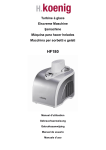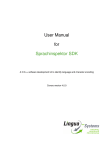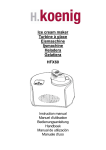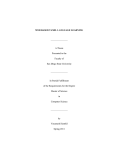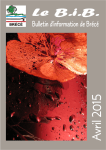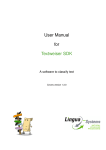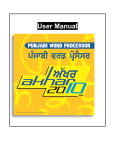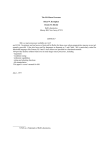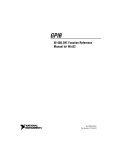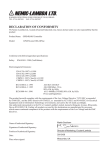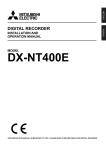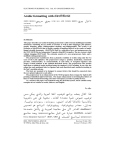Download Alphawandler SDK User Manual - Lingua
Transcript
User Manual for Alphawandler SDK A software for transliteration Covers version 1.0.0 Alphawandler User Manual, published April 23, 2014. c 2013-2014, Lingua-Systems Software GmbH Copyright Lingua-Systems Software [email protected] GmbH, Gerichtsstraße 42, 44649 Herne, Germany, All rights reserved, especially changing or publishing parts of this manual needs prior written permission of the copyright owner. The rights to reproduce and publish unchanged copies in any form, to translate or to present the manual are granted. Mentioned hard- and software as well as companies may be trademarks of their respective owners. Use of a term in this manual should not be regarded as affecting the validity of any trademark or service mark. A missing annotation of the trademark may not lead to the assumption that no trademark is claimed and may thus be used freely. Great effort has been made in writing this manual. However, faults cannot be excluded in general. For any loss or damages caused or alleged to be caused directly or indirectly by errors or omissions in this manual, the authors and the publisher assume no responsibility and cannot be held liable. Neither can the authors or the publisher be held liable for the content or changes of content concerning the linked websites. The links have been carefully chosen and proved at the preparation of the manual. If you have problems using the links or get aware of any faults, feel free to give a brief hint on it via [email protected]. Contents 1. Introduction 2. Installation 2.1. Requirements . . . . . . . 2.2. What will be installed . . . 2.3. Installing the Software . . 2.4. Deinstalling the Software 4 . . . . 5 5 5 5 5 3. Hints on the Usage of Alphawandler SDK 3.1. Supported Writing Systems and Standards . . . . . . . . . . . . . . . . . . . . . . . . . . 6 6 . . . . . . . . . . . . . . . . . . . . . . . . . . . . . . . . . . . . . . . . . . . . . . . . . . . . . . . . . . . . . . . . . . . . . . . . . . . . . . . . . . . . . . . . . . . . . . . . . . . . 4. Application Programming Interface 4.1. Overview . . . . . . . . . . . . . . . . . . . . . . . . . . . . . . . . . . 4.2. Important Data Structures . . . . . . . . . . . . . . . . . . . . . . . . . 4.2.1. Alphawandler-Object aw_t . . . . . . . . . . . . . . . . . . . . . 4.2.2. Transliteration Options aw_opt_t . . . . . . . . . . . . . . . . . 4.2.3. Transliteration Standard Information aw_info_t . . . . . . . . . 4.3. Function Reference . . . . . . . . . . . . . . . . . . . . . . . . . . . . 4.3.1. aw_translit() . . . . . . . . . . . . . . . . . . . . . . . . . . . . . 4.3.2. aw_get_transliterator() and aw_get_transliterator_by_number() 4.3.3. aw_get_info() . . . . . . . . . . . . . . . . . . . . . . . . . . . . 4.3.4. aw_version() and aw_version_string() . . . . . . . . . . . . . . 4.3.5. aw_strerror() . . . . . . . . . . . . . . . . . . . . . . . . . . . . 4.4. Error Handling . . . . . . . . . . . . . . . . . . . . . . . . . . . . . . . 4.4.1. aw_errno_t Named Error Constants . . . . . . . . . . . . . . . 4.5. Hints on Application Development . . . . . . . . . . . . . . . . . . . . 4.5.1. Determining Alphawandler SDK’s Version . . . . . . . . . . . . . . . . . . . . . . . . . . . . . . . . . . . . . . . . . . . . . . . . . . . . . . . . . . . . . . . . . . . . . . . . . . . . . . . . . . . . . . . . . . . . . . . . . . . . . . . . . . . . . . . . . . . . . . . . . . . . . . . . . . . . . . . . . . . . . . . . . . . . . . . . . . . . . . . . . . . . . . . . . . . . . . . . . . . . . . . . . . . . . . . . . . . . . . . . . . . . . . . . . . . . . . . . . 8 8 8 8 9 9 10 10 10 11 11 12 12 13 13 13 A. Example Application: example.c 14 B. References 15 About this Manual This manual addresses users with experience in C/C++ programming and at least a basic knowledge of library usage. The manual provides a short introduction to the library, followed by instructions how to install the Alphawandler software package. Afterwards some hints on the usage of a transliteration system are given, before the complete interface (API) is introduced along with the possibilities of error handling. For a quick start have a look at the documentation of the application programming interface (chapter 4 on page 8). Administrators who want to install the software can obtain all necessary information from chapter 2, page 5. 1. Introduction Alphawandler is a software for transliteration that transfers text from one writing system or alphabet to another one. Every transliteration is - wherever possible - done according to a given transliteration standard as defined by various national or international organisations, like ISO, DIN or GOST. Besides that, common national transliteration rules are included (see chapter 3 for details). If the chosen standard allows to, the transliteration can be used bidirectional. An intuitive interface to the library allows you to integrate Alphawandler easily. The C/C++ library is thread-safe and provides access to all functions needed to make use of a transliteration within your own application. Any input passed to Alphawandler has to be plain text and should be encoded in UTF-8. Page 4 Lingua-Systems’ Alphawandler v1.0.0 2. Installation 2.1. Requirements Alphawandler merely requires the system’s standard C runtime environment. 2.2. What will be installed The Alphawandler SDK contains a dynamic library (DLL/SO), its header file, the code of an example application and this manual. The Software Development Kit for Linux contains the following files: ./ doc : example . c LICENSE . txt manual - sdk - eng . pdf ./ include : aw . h ./ lib : libaw . so libaw . so .1 libaw . so .1.0.0 2.3. Installing the Software Alphawandler SDK is provided as a compressed archive, either in "Zip" or "tar.gz" form, depending on the target platform. To install the software, just unpack the archive to a directory of your choice and add the library and header files to your project. 2.4. Deinstalling the Software To deinstall the software, just remove the directory you unpacked Alphawandler SDK to. Lingua-Systems’ Alphawandler v1.0.0 Page 5 3. Hints on the Usage of Alphawandler SDK Only input in plain text format can be processed, that is encoded in UTF-8. The transliteration is based on standards. If the input contains characters that do not belong to the writing system covered by the standard, they will remain unchanged in the output. Common DEU Common DEU "Aepfel Кремль" aw_translit() "Äpfel Кремль" ISO 9 ISO 9 "Äpfel Kremlʹ" Figure 1: Minimal Transliteration Example Some transliterations can only be applied in one direction. These lossy transliterations are not reversible, because the mapping of characters is ambiguous. Example: The German word Äpfel would be transliterated as Aepfel according to the "‘Common DEU"’ standard - but it is not possible to reverse the direction of the transliteration, because the character sequence ae is also common without denoting the umlaut ä, as in Michael or Tetraeder. 3.1. Supported Writing Systems and Standards Cyrillic Standard Description Reversible ALA-LC RUS Cyrillic to Latin, Russian no ISO 9 Cyrillic to Latin yes DIN 1460 RUS Cyrillic to Latin, Russian yes DIN 1460 UKR Cyrillic to Latin, Ukrainian yes DIN 1460 BUL Cyrillic to Latin, Bulgarian yes Streamlined System BUL Cyrillic to Latin, Bulgarian no GOST 7.79 RUS Cyrillic to Latin, Russian yes GOST 7.79 RUS OLD Cyrillic to Latin with support for Old Russian (pre 1918), Russian no GOST 7.79 UKR Cyrillic to Latin, Ukrainian no Standard Description Reversible ISO 843 Greek to Latin no DIN 31634 Greek to Latin (academic) no Greeklish Greek to Latin (phonetic) no Greek Page 6 Lingua-Systems’ Alphawandler v1.0.0 Latin Standard Description Reversible Common CES Czech without diacritics no Common DEU German without umlauts/sz-ligature no Common POL Unaccented Polish no Common RON Romanian without diacritics no Common SLK Slovak without diacritics no Common SLV Slovenian without diacritics no Additional languages can be added upon request. Lingua-Systems’ Alphawandler v1.0.0 Page 7 4. Application Programming Interface 4.1. Overview The C/C++ library contained in the Alphawandler SDK provides an API that is intuitive to use and allows integration into applications easily. All functions and data structures are prefixed aw_ to avoid confusions and collisions with other third party library functions and are defined in the header file aw.h. Input passed to the library is expected to be plain text and encoded in UTF-8. aw_strerror() provides an English error messages for each error code. aw_version() and aw_version_string() provide the library’s version at runtime. All functions are thread-safe and may be called from multiple threads simultaneously. Select Standard Transliterate "ISO 9" "Кремль" aw_get_transliterator() aw_translit() prepares aw_t pointer to returns aw_errno_t set "Kremlʹ" String pointer to returns aw_errno_t Cleanup aw_free_string() Figure 2: Transliteration 4.2. Important Data Structures The data structure aw_errno_t is described in a separate chapter on error handling (chapter 4.4, page 12). 4.2.1. Alphawandler-Object aw_t The data structure aw_t contains data that is exclusively used by Alphawandler internally. No application should evaluate or change the data directly. An aw_t object represents a transliterator that is required by aw_translit in order to transliterate a given input string. First, you should assign the macro AW_T_INITIALIZER to any variable of type aw_t on declaration in order to initialize it with its default values. Page 8 Lingua-Systems’ Alphawandler v1.0.0 The functions aw_get_transliterator() and aw_get_transliterator_by_number() then prepare an aw_t object to be used to transliterate according to a given standard. An aw_t object is expected as an argument by almost every Alphawandler main function. 4.2.2. Transliteration Options aw_opt_t The following options are provided and can be passed to aw_translit(): Option AW_DEFAULT AW_REVERSE AW_NO_VALIDATE Meaning Use defaults Reverse transliteration direction Disable input validation Figure 3: aw_opt_t Options and their Meaning If AW_DEFAULT is given, transliteration is done in the forward direction (that is to Latin) with enabled UTF-8 validation. If the option AW_REVERSE is passed to aw_translit() although the chosen transliteration standard does not support reverse transliteration, AW_ENOREV will be returned as an error indicator. AW_NO_VALIDATE disables UTF-8 input validation and may have a positive impact on execution speed. However, this option should only be considered if the input is already known to consist of valid UTF-8 octets only. 4.2.3. Transliteration Standard Information aw_info_t Information on a transliterator and the underlying transliteration standard can be retrieved after selecting a standard with either aw_get_transliterator() or aw_get_transliterator_by_number(). Each variable of type aw_info_t should be initialized using the AW_INFO_T_INITIALIZER macro right on its declaration. The data structure provides some details on the selected aw_t transliterator: 1. Name of the transliteration standard 2. Short description of the standard 3. Reversibility indicator The formal definition of the data structure is as follows: typedef struct aw_info { const char * name ; const char * description ; enum { AW_NON_REVERSIBLE , AW_REVERSIBLE } reversible ; } aw_info_t ; If reversible is set to AW_REVERSIBLE, the transliteration direction can be reversed, AW_NON_REVERSIBLE indicates that this is not possible. Lingua-Systems’ Alphawandler v1.0.0 Page 9 4.3. Function Reference All of Alphawandler’s functions and data structures are defined in the header file aw.h. The header has to be included in all applications that make use of the following functions. Code for an example application covering Alphawandler’s main functions is included in this manual (see appendix A on page 14) and in the software distribution. 4.3.1. aw_translit() aw_errno_t aw_translit ( const aw_t aw , const char * input , aw_opt_t options , char ** output ); aw_translit() transliterates an input string input according to the transliteration standard set for aw using the passed options and stores the address of the transliterated output string to the address output points to. The first argument (aw) has to be an initialized Alphawandler object of aw_t type (see chapter 4.2.1 on page 8). The object must have previously been assigned a transliteration standard using either aw_get_transliterator() or aw_get_transliterator_by_number(). The input has to be UTF-8 encoded and properly terminated. The mode of operation may be set using the options: AW_DEFAULT or AW_REVERSE (see 4.2.2 on page 9). The functions return an error code that indicates whether the respective function succeeded (AW_OK) or an error occurred. For details on error handling see chapter 4.4 on page 12. The function allocates memory for the transliterated string and assigns its address to the object pointed to by output. The used memory may be freed using aw_free_string(), which is mandatory on Windows systems. The functions is thread-safe and can thus be used by more than one thread at a time. 4.3.2. aw_get_transliterator() and aw_get_transliterator_by_number() aw_errno_t tr_get_transliterator ( const char * name , aw_t ** aw ); aw_errno_t tr_get_transliterator_by_number ( size_t number , tr_t ** aw ); Both functions assign a transliterator for a transliteration standard to an Alphawandler object. The standard may either be referenced by its name or its number . Named references of standards (see chapter 3 on page 6) are case-insensitive. Besides that, underscores and hyphens may be used instead of blanks (e.g. iso_9 or iso-9). Page 10 Lingua-Systems’ Alphawandler v1.0.0 The functions return an error code that indicates whether the respective function succeeded or an error occurred. For details on error handling see chapter 4.4 on page 12. The function aw_get_transliterator_by_number() is mostly useful to iterate over all transliterators provided for the set of supported standards. When iterating, start with one (1) and continue until the function returns AW_ESTD instead of AW_OK. Both functions are thread-safe and thus can be used by more than one thread at a time. The internal numbering of transliterators may change from release to release. Therefore, only aw_get_transliterator() should be used if an individual transliterator should be selected. 4.3.3. aw_get_info() aw_errno_t aw_get_info ( const aw_t aw , aw_info_t * info ); The function stores information on an Alphawandler object aw into an aw_info_t variable pointed to by info. The first argument (aw) has to be an initialized Alphawandler object of aw_t type (see chapter 4.2.1 on page 8). The object must have previously been assigned a transliteration standard using either aw_get_transliterator() or aw_get_transliterator_by_number(). The function returns an error code that indicates whether the respective function succeeded (AW_OK) or an error occurred. For details on error handling see chapter 4.4 on page 12. The function is thread-safe and can thus be used by more than one thread at a time. The variable of type aw_info_t that is pointed to by info should be initialized using AW_INFO_T_INITIALIZER on its declaration. The function does not need to allocate any memory for the aw_info_t data structure or its members. As a result, code using this function does not need to free memory of the structure or its members either. 4.3.4. aw_version() and aw_version_string() unsigned int aw_version ( void ); const char * aw_version_string ( void ); The functions do not take an argument and return the version of the Alphawandler SDK in a numeric or character-based representation. The functions are thread-safe and thus can be used by more than one thread at a time. The memory of the string returned by aw_version_string() must not be freed. Lingua-Systems’ Alphawandler v1.0.0 Page 11 4.3.5. aw_strerror() const char * aw_strerror ( aw_errno_t errnum ); The function takes an error indicator errnum of type aw_errno_t as an argument and returns a pointer to a read-only string (const char *) containing the English error message. A list of all error codes and descriptions is given in chapter 4.4.1 on page 13. The function is thread-safe and thus can be used by more than one thread at a time. The memory of the returned string must not be freed. 4.4. Error Handling Alphawandler provides an easy to use way to handle errors by evaluating the return value. Every function that may fail has an error indicator as a return value. Any application that uses Alphawandler should evaluate this error indicator to implement an adequate error handling. The return value AW_OK indicates that the function was successful. Error messages may be obtained using aw_strerror() (see chapter 4.3.5 on page 12). Alphawandler Function Error? No, returns Yes, returns AW_OK Error Code passed to aw_strerror() evaluate Error Handling returns Error Message Figure 4: Flowchart of Alphawandler’s Error Handling Page 12 Lingua-Systems’ Alphawandler v1.0.0 4.4.1. aw_errno_t Named Error Constants Alphawandler uses the data structure aw_errno_t to provide named error constants for all error cases. The following table comprises all named error constants used in Alphawandler SDK, accompanied by the error messages returned if passed to aw_strerror(). Constant AW_OK AW_ENOMEM AW_EARG AW_EUINV AW_ESTD AW_ENOREV Error Message No error Failed to allocate memory Invalid argument Invalid unicode No such transliteration standard Standard is not reversible Figure 5: aw_errno_t Named Constants and Error Messages 4.5. Hints on Application Development 4.5.1. Determining Alphawandler SDK’s Version After including the aw.h header, the following preprocessor definitions are available at compile time. Definition Value AW_VERSION_MAJOR 1 AW_VERSION_MINOR 0 AW_VERSION_PATCH 0 Figure 6: Version Information at Compile Time To determine Alphawandler’s version at runtime, use aw_version() or aw_version_string(). Lingua-Systems’ Alphawandler v1.0.0 Page 13 A. Example Application: example.c # include < stdio .h > # include < stdlib .h > # include <aw .h > static aw_errno_t translit ( const char * std , const char * txt , char ** out ) { aw_t aw = AW_T_INITIALIZER ; aw_errno_t err = AW_OK ; if (( err = aw_get_transliterator ( std , & aw )) != AW_OK ) { fprintf ( stderr , " Error : % s (% d )\ n" , aw_strerror ( err ), err ); return err ; } if (( err = aw_translit ( aw , txt , AW_DEFAULT , out )) != AW_OK ) { fprintf ( stderr , " Error : % s (% d )\ n" , aw_strerror ( err ), err ); return err ; } } return AW_OK ; int main ( int argc , char * argv []) { char * out = NULL ; if ( argc != 3) { fprintf ( stderr , " usage : % s standard text \ n" , argv [0]); return EXIT_FAILURE ; } if ( translit ( argv [1] , argv [2] , & out ) == AW_OK ) { puts ( out ); aw_free_string ( out ); return EXIT_SUCCESS ; } } Page 14 return EXIT_FAILURE ; Lingua-Systems’ Alphawandler v1.0.0 B. References → Lingua-Systems’ Alphawandler website, http://www.lingua-systems.com/transliteration/ → Alphawandler software specification for version 1.0.0 → The Unicode Standard, http://www.unicode.org/ → RFC 2279: "UTF-8, a transformation format of ISO 10646", http://www.ietf.org/rfc/rfc2279.txt → ALA-LC Romanization Tables, http://www.loc.gov/catdir/cpso/roman.html → International Organization for Standardization, http://www.iso.org/ → German Institute for Standardization, http://www.din.de/ → Federal Agency on Technical Regulating and Metrology (GOST), http://www.gost.ru/ → Bulgarian Academy of Sciences, http://www.bas.bg/ http://www.lingua-systems.com/transliteration/ Lingua-Systems’ Alphawandler v1.0.0 Page 15 Index A application programming interface (API) . . . . . . . . 8 AW_DEFAULT . . . . . . . . . . . . . . . . . . . . . . . . . . . . . 9, 10 aw_errno_t . . . . . . . . . . . . . . . . . . . . . . . . . . . . . . . 12, 13 AW_EARG . . . . . . . . . . . . . . . . . . . . . . . . . . . . . . . 13 AW_ENOMEM . . . . . . . . . . . . . . . . . . . . . . . . . . . 13 AW_ENOREV . . . . . . . . . . . . . . . . . . . . . . . . . 9, 13 AW_ESTD. . . . . . . . . . . . . . . . . . . . . . . . . . . .11, 13 AW_EUINV . . . . . . . . . . . . . . . . . . . . . . . . . . . . . . 13 AW_OK . . . . . . . . . . . . . . . . . . . . . . . . . . . . . . . . . . 13 aw_free_string() . . . . . . . . . . . . . . . . . . . . . . . . . . . . . . 10 aw_get_info() . . . . . . . . . . . . . . . . . . . . . . . . . . . . . . . . . 11 aw_get_transliterator() . . . . . . . . . . . . . . . . . . . . . . . . 10 aw_get_transliterator_by_number() . . . . . . . . . . . 10 aw_info_t . . . . . . . . . . . . . . . . . . . . . . . . . . . . . . . . . . . . . . 9 AW_INFO_T_INITIALIZER . . . . . . . . . . . . . . . . . . . 11 AW_NO_VALIDATE . . . . . . . . . . . . . . . . . . . . . . . . . . . . 9 AW_NON_REVERSIBLE . . . . . . . . . . . . . . . . . . . . . . 9 aw_opt_t . . . . . . . . . . . . . . . . . . . . . . . . . . . . . . . . . . . . . . 9 AW_REVERSE . . . . . . . . . . . . . . . . . . . . . . . . . . . . 9, 10 AW_REVERSIBLE. . . . . . . . . . . . . . . . . . . . . . . . . . . . .9 aw_strerror() . . . . . . . . . . . . . . . . . . . . . . . . . . . . . . 12, 13 aw_t . . . . . . . . . . . . . . . . . . . . . . . . . . . . . . . . . . . . . . . . . . . 8 AW_T_INITIALIZER . . . . . . . . . . . . . . . . . . . . . . . . . . . 8 aw_translit() . . . . . . . . . . . . . . . . . . . . . . . . . . . . . . . . . . 10 aw_version() . . . . . . . . . . . . . . . . . . . . . . . . . . . . . . 11, 13 AW_VERSION_MAJOR . . . . . . . . . . . . . . . . . . . . . . 13 AW_VERSION_MINOR . . . . . . . . . . . . . . . . . . . . . . 13 AW_VERSION_PATCH . . . . . . . . . . . . . . . . . . . . . . . 13 aw_version_string() . . . . . . . . . . . . . . . . . . . . . . . 11, 13 D data structures. . . . . . . . . . . . . . . . . . . . . . . . . . . . . . . . .8 aw_errno_t . . . . . . . . . . . . . . . . . . see aw_errno_t aw_info_t . . . . . . . . . . . . . . . . . . . . . see aw_info_t aw_opt_t . . . . . . . . . . . . . . . . . . . . . . see aw_opt_t aw_t . . . . . . . . . . . . . . . . . . . . . . . . . . . . . . . see aw_t deinstalling the software . . . . . . . . . . . . . . . . . . . . . . . 5 dependencies . . . . . . . . . . . . . . . . . see requirements E error codes . . . . . . . . . . . . . . . . . . . . . . see aw_errno_t error handling . . . . . . . . . . . . . . . . . . . . . . . . . . . . . . . . 12 named constants . . . . . . . . . . . . . . . . . . . . . . . . . 13 example application example.c . . . . . . . . . . . . . . . . . . . . . . . . . . . . . . . . 14 I installing the software . . . . . . . . . . . . . . . . . . . . . . . . . . 5 N named error constants . . . . . . . . . . . . . . . . . . . . . . . . 13 R requirements . . . . . . . . . . . . . . . . . . . . . . . . . . . . . . . . . . 5 T transliteration standard information see aw_info_t transliteration standards . . . . . . . . . . . . . . . . . . . . . . . 6
















